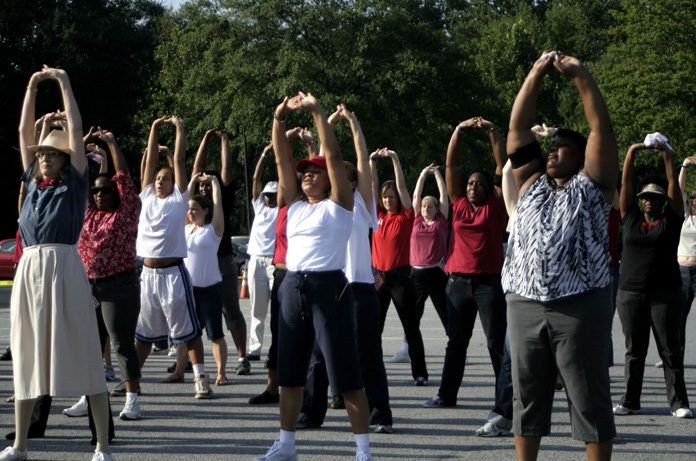A group of researchers in Japan performed a longitudinal study to measure the effects of physical activity on various neurocognitive indicators in people diagnosed with schizophrenia.
They found that certain types of exercise are associated with improved executive function and reaction time.
Schizophrenia is a psychological disorder characterized by abnormal thought processes and behavior, and a disconnect between perception and reality.
A person affected by schizophrenia can experience a wide range of symptoms such as hallucinations, delusions, and deficits in emotional responses. A key hallmark of the disorder is the impairment of cognitive function, the extent of which varies across the patient population.
This dysfunction can impact things like long-term memory, executive functioning, processing speed, and attention.
The inability of people diagnosed with schizophrenia to successfully integrate into society is by and large a product of this kind of cognitive impairment. Forming meaningful relationships, participating in social functions, and finding and keeping employment and home are all things that many schizophrenics struggle with.
Thus, helping improve quality of life by targeting cognitive dysfunction as a treatment strategy is of interest to medical researchers.
Several studies in the recent past have looked at the link between physical activity and neurocognitive function in people with schizophrenia, but the limited depth of this research has led to results that are somewhat inconclusive.
This is due to several factors: These studies have had a relatively small sample size and scope, and they have not focused on the possible effect that particular kinds of activities and variations in their duration and intensity could have on neurocognition.
Furthermore, they have only measured the effect of physical activity on a subset of widely accepted neurocognitive indicators.
A recent study published in inComprehensive Psychiatry by a research group at Japan’s Kyorin University aimed to fill these gaps in the literature.
This preliminary longitudinal investigation looked at 2 time points, baseline and 6-month follow-up, for a group of 25 patients diagnosed with schizophrenia. The participants were evaluated for psychiatric symptoms at baseline over 1 week using the Positive and Negative Syndrome Scale (PANSS).
They were also assessed for baseline neurocognitive function using the Cognitrax basic package, in which patients were asked to complete 7 tasks associated with verbal memory, visual memory, attention shifting, processing speed, and executive function, among other metrics.
Once baseline data had been obtained, the participants were instructed on how to wear and use a triaxial accelerometer around their waist for 1 week to measure physical activity.
This instrument recorded data such as total steps per day, total time/step, total calorie consumption, and the calorie consumption of each activity (called metabolic equivalents) for several activities like walking moderate exercise, and vigorous exercise.
Follow-up was conducted 6 months later and the same cognitive functions were measured.
For each of the parameters measured, the researchers divided the participants into two groups, an increased activity group and a decreased activity group. The changes in scores from the two groups were compared to each other for statistical significance.
The study predominantly revealed 2 key findings. For several activities, an increase in steps was correlated with improved executive function.
In addition, an overall increase in daily activity time was associated with higher reaction time scores.
Interestingly, the data suggested that high-intensity exercise may not provide any incremental benefit over moderate exercise in neurocognitive function as the difference in reaction time improvement between those engaging in these two types of activity was not significant.
The study cited several limitations to be considered when interpreting the results.
The sample size was small, making it difficult to extrapolate the results to the schizophrenic patient population.
The causal relationship between activity and neurocognitive domains was not investigated, and no distinction was made between inpatients and outpatients.
Finally, participants were prescribed fairly high doses of antipsychotic medication, which might have influenced physical activity or neurocognition, however, the authors note that there was no significant difference in these dosages between the increased and decreased activity groups for any of the cognition indicators.
Overall, this preliminary study provides a glance at the relationship between physical activity and neurocognition in people with schizophrenia and suggests that certain types of activity can have a positive psychological impact.
Written By: Adriano Vissa, PhD candidate
Kurebayashi Y and Otaki J. Association between altered physical activity and neurocognitive function among people with schizophrenia: A minimum 6-months’ follow up study. Comprehensive Psychiatry. 77 (2017) 45-42.
Relevant topics that may be of interest:
- The link between physical activity and brain integrity
- Can physical activity reverse the effects of a sedentary lifestyle?
- Nutrition and physical activity intervention for weight loss in obese students
- Too much physical activity may negatively affect an athlete’s performance
- Physical activity reduces risk of cardiovascular disease in menopausal women



